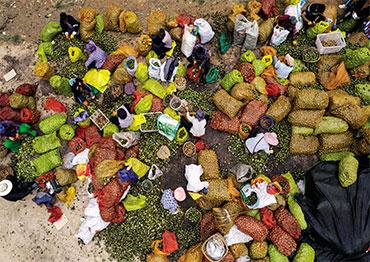Qu and Zhao became famous overnight in August 2022. The story goes that they met “accidentally” in Hagan Town, around 35 kilometers from Gumo. Qu Bu, from the Yi ethnic group, was a handsome herder when Zhao met him near his home in the mountains. Zhao, who did not previously have a substantial online following, comes from Huili, a city in southern Liangshan. When Zhao posted videos about Qu’s life on short-video platform Douyin (China’s TikTok), the reaction was instant. Qu shared stories about his family’s “miserable” life in impoverished Liangshan. Support and sympathy from hundreds of thousands of viewers flooded in. Qu’s good looks and air of unsophistication appealed to netizens. Now, Zhao and Qu each have over two million followers on Douyin, and the video of the two encountering each other has 2.49 million likes and 119,000 reposts.
The pair then started leveraging their online fame to sell agricultural products through livestreams. A resident of Liangshan with knowledge of the business told NewsChina on condition of anonymity: “Every time they sell products online, they make sales worth millions of yuan.”
Some viewers were skeptical. They questioned the authenticity of Qu’s story, guessing the videos were scripted and made professionally. Zhao defended their output on August 25, 2022, claiming the pair was not backed or funded by a company. She insisted the livestreams were filmed at Qu’s home.
However, after NewsChina visited Gumo, it became clear that a video released by Zhao in mid-April was shot there. Residents had paid attention to the comings and goings of the outsiders. They went out in the day and returned to the rented properties at night. La Luo said he knew they were making videos and livestreaming, and had millions of followers. “They rented abandoned old houses in the mountains to shoot their videos. Sometimes they’d make a fire and cook there,” La said.
Even though they stayed in the village over six months, the group kept to themselves. “They minded their own business, they rarely spoke with us,” La said. He said they occasionally donated some “charity” gifts to residents while livestreaming their show. After each show, they paid villagers who took part 100-200 yuan (US$14-29).
It was stormy on April 14 when the reporter arrived in Gumo. Ah Liu, who said he works with Qu and Zhao, was very excited, explaining that the production team had planted a corn crop, but it would die without rain.
Ah Liu said he had been in the village for over eight months producing videos. The team rented three buildings for 1,000 yuan (US$144) a month each. He admitted that they had produced videos for celebrities like Qu, and he said he stayed with him in Gumo. “But Qu’s been at home for the last couple of months to help on the farm,” said Ah Liu, claiming that a local girl had introduced Qu as a potential protagonist for their designed videos.
Ah Liu complained that livestreaming is very competitive in Liangshan. “Many people come from big cities like Hangzhou or Chengdu. They all make similar videos, so they’re locked in fierce competition with each other,” he said.
Ah Liu’s team has 30 people. They look for local suppliers for rural products, and facilitate screening, packaging and delivery. Ah Liu is responsible for marketing and attracting online traffic. Qu Bu, the newly emerged celebrity, was chosen and packaged by his team.
The “accidental encounter” scenario is a common device used by livestream teams in Liangshan to hook people. Many of the videos make superficial changes then reuse the same scenarios.
On August 19, 2022, Zhao Ling’er released a video of her “encountering” Qu Bu. She was invited to his home, introduced to his family and listened to stories about their lives. Qu said his father died when he was 8, and his mother brought him and his three younger sisters up alone. This video went viral, and Qu Bu became an overnight celebrity.
An anonymous insider who works in the livestream business told NewsChina that these overnight success stories are mainly due to the setting in Liangshan, which was once China’s least developed area. Home to the 2.1 million people of the Yi ethnic group among a population of some five million, and with a reputation for an unspoiled natural environment and unique customs, Liangshan is considered a “natural hotspot for online traffic” and an “internet celebrity IP” that allows for quick exposure and gains netizens’ attention. Short-video producers took note and flocked to the region.
Previously cut off from modern development, Liangshan was a particular target of China’s campaign to eradicate extreme poverty by 2020. It first became famous in 2016, when photos by a Chinese journalist of children clambering up a precipitous mountain on a rickety bamboo ladder to get to school went viral. There were 2,072 impoverished villages and 11 deeply impoverished counties in Liangshan identified when the campaign started in 2015, but by 2020, these were removed from the extreme poverty list, the Global Times reported. Still, earnings are below the national average, though much improved. In 2022, average annual per capita income in Liangshan was 18,000 yuan (US$2,470), while the average annual per capita national income was 36,900 yuan (US$5,059), according to government data.
“A lot of people want to take advantage and gain personal popularity, so they come,” a business person in Liangshan told the reporter: “People think Liangshan is a poor, backward place and an ethnic area, so it’s easy to gain sympathy.”

 Old Version
Old Version





